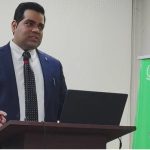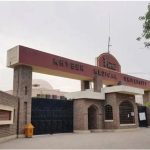Karachi: Efforts are being made by some academics affiliated with the present government to reverse steps taken by the Higher Education Commission of Pakistan (HEC) to improve the standard of varsity education and research in the country.
HEC Chairman Prof Dr Tariq Banuri stated this on Wednesday while addressing a news conference at the Karachi Press Club. Without explicitly naming anyone, he said some academics and ‘so-called’ scientists were creating hurdles in the smooth functioning of the HEC due to vested interests. He said such academics would allocate discretionary funds to specific institutes of their choice.
In March 2021, Prof Banuri was sacked by the federal government as the HEC chairman but was reinstated by an Islamabad High Court order in January this year. Since then, he has alleged on multiple occasions that some elements in the government setup have been trying to undermine him as they are not happy with his reinstatement.
“In recent years, the HEC started dismantling some of the worst forms of intrusion into university functioning and revived formula-based equitable funding allocation for universities as well as research centres,” he said, adding that when he started to stop the system of discretionary funding, some academics and scientists having a vested interest started to oppose him as the HEC chairman.
He said that during his tenure, the commission transferred some discretionary programmes back to universities, including travel and conference grants. The HEC was also transferring all the authority for recruitment, promotion and tenure back to universities, and beefing up the research grant evaluation process to make it transparent, merit-based, and equitable, he maintained.
Prof Banuri said he also developed a new administrative structure for engaging the statutory bodies of universities directly in order to stop ad hoc interventions. “Not surprisingly, these initiatives were opposed tooth and nail by some interested parties, including some entitled VCs, favoured research centres, and governmental and HEC bureaucracies. Some were reversed in the past 11 months.”
If universities lacked autonomy, they would never have the incentive to take the initiative to enhance quality of research and education, he said. Lamenting the poor state of higher education in the country, he remarked that currently, a vast majority of students was being cheated out of time and money, leaving only with a piece of paper called a degree, which is often not valued by future employers.
He alleged that he was sacked by the government because he had adopted a policy for forensic audit of research centres. Prof Banuri criticised the earlier HEC policies, which, he said, rewarded the varsities for quantity of research papers while ignoring the quality aspect all together. He said such policies prompted academics to use fraudulent ways to maximum papers published, which caused an ‘epidemic’ of plagiarism, which has yet to abate.
He said quality of teaching was also ignored in the HEC’s evaluation criteria for the varsities, due to which an apartheid system in the faculty was created where the highest honours and benefits were reserved for those with least teaching obligations. He called it not only an educational crisis, but also a serious human rights issue.
To address these issues, he said the commission during his tenure introduced policies for undergraduate and graduate education that focused squarely on quality, defined as the enhancement of future success of graduates.
“We developed criteria for effective teaching through the Best University Teacher Award process and raised the threshold of justification for new programmes,” he said, adding that the HEC also supported universities in installing learning management systems (LMS), which was the first step in enhancing the transparency of educational quality. He, however, said that most of these initiatives were attacked during 11 months when he had been in litigation after being sacked.







